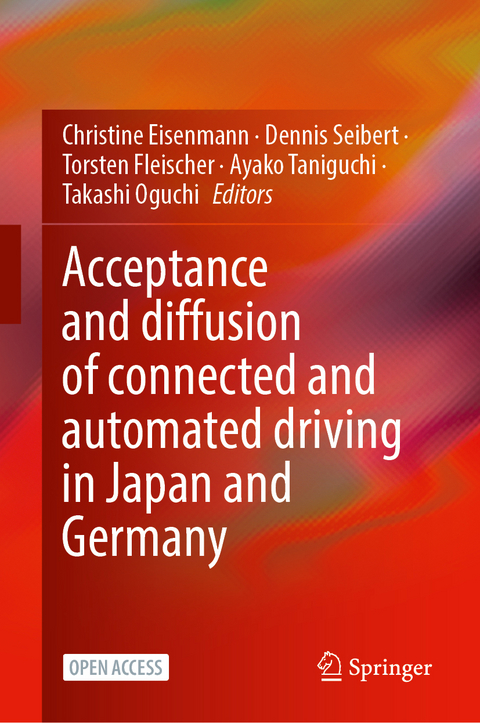
Acceptance and Diffusion of Connected and Automated Driving in Japan and Germany
Springer International Publishing (Verlag)
978-3-031-59875-3 (ISBN)
This open access book gives comprehensive empirical insights on connected and automated driving (CAD) of road transport vehicles which leads to the driver being partially or completely replaced by automation. The current trend towards widespread research and development of automation of motorised individual transport is driven by the expected benefits, such as increased road safety, smoother traffic flow, reduction of congestion, or use of driving time for other activities. CAD has the potential to change several dimensions of the transport system, ranging from changes in car ownership to the availability of entirely new mobility services. Some proponents even expect CAD to revolutionise the current transport system as a whole. In order to make informed statements about the possible impact of CAD on transport systems, research must consider a wide range of open questions: In what way do the existing framework conditions of the prevailing mobility systems affect the impact of CAD? How does the governance style relate to regulatory changes and resource allocation in the development of CAD? Is an autonomous ride-hailing service really a profitable business case? What are the attitudes and expectations towards CAD in the general public? What are the effects of CAD on transport systems? What are other impacts of CAD that should be assessed? All of these questions were addressed within different projects as part of the Japanese-German Research Cooperation on CAD and can be discovered by the reader of this book.
Dr.-Ing. Christine Eisenmann is group leader at the Institute of Transport Research of the German Aerospace Center (DLR). Christine Eisenmann holds a diploma (Masters equivalent) in Economics Engineering from the Karlsruhe Institute of Technology (KIT) (2012) and worked and received her PhD at the KIT Institute of Transportation (2012 to 2018). She also studied and conducted research at the University of Iceland, Iceland (2009-2010) and at Virginia Tech, USA (2016). Dennis Seibert is a research associate at the Institute of Transport Research of the German Aerospace Center (DLR). He holds a Master of Science in Economics from the University of Bayreuth. At the DLR, he has worked on passenger car fleet modeling and climate protection scenarios in the transport sector. Before joining DLR, he worked on macroeconomic issues applying input-output analysis. Torsten Fleischer is head of the research group ‘Mobility Futures’ at the Institute for Technology Assessment and Systems Analysis (ITAS), Karlsruhe Institute of Technology (KIT), as well as one of its deputy directors. Originally a physicist by training, he is now interested in the interdependence between societal change and technological change especially in the areas of transportation, information and energy technologies, in methodological questions of technology assessment and in the governance of innovation processes. Dr.-Eng. Ayako Taniguchi is a professor at the University of Tsukuba, Japan. She continues to apply the findings of psychology to urban transport planning since 1999. She started her career as a construction consultant engineer in 1997, obtained her PhD (in engineering) degree from Hokkaido University in 2003 and has been working at Tokyo Institute of Technology since 2003 and at University of Tsukuba since 2005. Dr. Takashi Oguchi is a professor at the Institute of Industrial Science (IIS) of the University of Tokyo (UTokyo) in Japan and the Director of the Advanced Mobility Research Center (ITS Center) in IIS of UTokyo since 2018. After receiving a Master of Engineering (1990) and a PhD in Engineering (1993) in UTokyo, he joined Nissan Motor Co., Ltd. (1993-1995) and Tokyo Metropolitan University (1995-2011) before moving to his current position.
Introduction.- Setting the Scene for Automated Mobility: A Comparative Introduction to the Mobility Systems in Germany and Japan.- Governance, Policy and Regulation in the Field of Automated Driving: A Focus on Japan and Germany.- Business Analysis and Prognosis Regarding the Shared Autonomous Vehicle Market in Germany.- Transportation Effects of Connected and Automated Driving in Germany.- Transportation Effects of CAD in Japan.- Overall Comparison Between Germany and Japan in Relation to Social Impact of Connected and Automated Driving.
| Erscheinungsdatum | 03.12.2024 |
|---|---|
| Zusatzinfo | V, 231 p. 48 illus., 39 illus. in color. |
| Verlagsort | Cham |
| Sprache | englisch |
| Maße | 155 x 235 mm |
| Themenwelt | Technik ► Bauwesen |
| Technik ► Fahrzeugbau / Schiffbau | |
| Technik ► Maschinenbau | |
| Schlagworte | Business Analysis of Ride-hailing Market • car ownership • connected and automated driving • diffusion paths • impact assessment • Japanese German Research Cooperation • open access • Social Acceptance • transport modeling |
| ISBN-10 | 3-031-59875-X / 303159875X |
| ISBN-13 | 978-3-031-59875-3 / 9783031598753 |
| Zustand | Neuware |
| Informationen gemäß Produktsicherheitsverordnung (GPSR) | |
| Haben Sie eine Frage zum Produkt? |
aus dem Bereich


